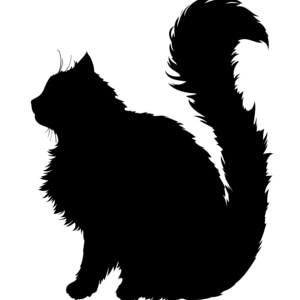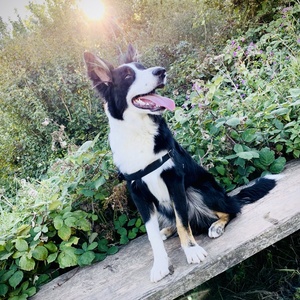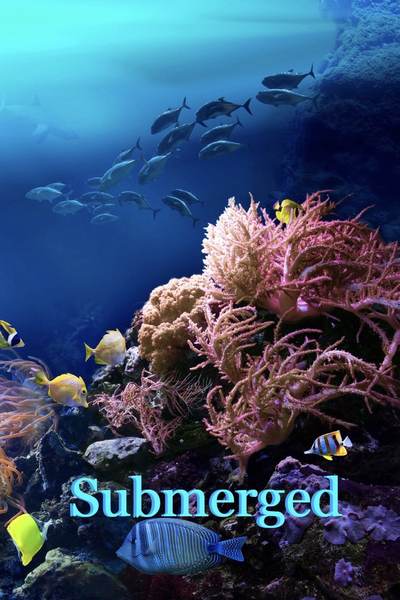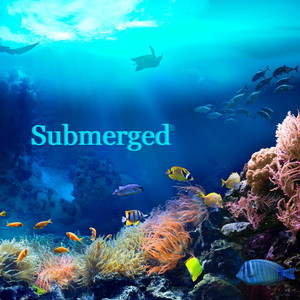I skimmed along the bottom of the ocean, searching until I located my target. I quickly scooped up the young water nymph and swam back towards the merfolk community, keeping a secure hold on the now squirmy child.
“But I want to explore!” The child whined. “Mommy takes care of the clams all day and Daddy’s busy with the lobsters, so they won’t ever take me out to see stuff!”
“It’s dangerous to explore on your own,” I explained, without releasing my hold. “That’s why you’re not supposed to run off on your own. Why don’t you wait until your teacher takes you all out?”
“It’s not dangerous!” The child protested. “I’m still in the village and sealife doesn’t hurt nymphs!”
True on both accounts, but that didn’t mean it wasn’t dangerous. The danger came from the child not yet understanding the risk of what was above the surface. Humans. Land-based supernaturals. All of that. This child had never yet left the ocean and not only didn’t know how to properly hide what they were from humans, but how to protect themselves from things that could hurt them.
And I knew only too well how dangerous the surface could be.
“Your parents are worried,” I told the child instead. “That’s why they asked me to go find you.” I paused to give the child a piece of a rare shrimp – something almost like candy to merfolk – and gently pinched their cheek while giving them a smile and eliciting a reluctant one in return. “I know it seems pointless now, but they’re just looking out for you, okay? Tell you what – see if they have time to take you out someday, and if not, I’ll come and swim with you instead, just so long as you promise me you won’t wander off alone again.”
The child considered this offer, and then nodded obediently. “Okay, I promise.”
Promise secured, I safely deposited the child back with their mother – who spent a few minutes fussing over the child before trying to introduce them to the joys of clam farming – and, satisfied with one happy result, headed off to my next task.
“Oh, Sage,” the elderly stingray shifter greeted me when she spotted me. She had to use magic to communicate underwater since she was a shifter, so her voice was a little muffled but still easy to make out. “I’m so glad to see you. You think you can help me move the rocks? I want to create a new pen for the fish but being a stingray, I can’t move them on my own.”
“Of course!” I responded cheerfully. “That’s why I’m here – to help!”
This shifter was one of our “fish farmers,” as it were. Merfolk were predators of the ocean, just like sharks or orca or seals – only we were more effective about it. Even water nymphs ate seafood, which was a little different from their land-based cousins who generally preferred to be vegetarians. This was part of living in the sea, though – obtaining all our food from it. Or most of our food, since those who dared live on the surface ate land-based food as well. But it only made sense that we got most of our food from the ocean, because we spent most of our lives in it.
Generally, merfolk spent at least half of our lives underwater, but likely closer to 2/3 or more – and that applied to all the types of merfolk, whether oceanid like me, aquatic shifter like this fish farmer, sea nymph like the child and their parents, or any of the other approximately dozen species which were all considered merfolk. Some merfolk liked to live above the surface, mingling with humans and supernaturals and whatever else, but they still had to live near the ocean and come underwater frequently. Others, like me, rarely went above the surface if we could help it.
But just because we were some of the ocean’s strongest predators didn’t mean we wanted to be cruel to what we ate. Merfolk were very strict about treating our food with respect and ethically catching what we ate. If we didn’t catch our food ourselves, we either went to another merfolk to buy food or at least a fisherman whom we knew ethically sourced their seafood. Usually, in towns that had any sort of merfolk population, there would be at least one person who would deliberately farm fish, like this shifter did, to sell to those who lived on the surface or those who didn’t have the time to catch their own food.
I followed the shifter out to the area where she wanted to create a new pen. I listened to her instructions, then considered the rocks. “I think I’ll have to shift,” I told her. “I suspect I’ll need more strength.”
Oceanids like myself were one of the most powerful of merfolk species. All merfolk had some elemental magic – water, earth, air, and fire – even shifters, unlike their land cousins, but oceanids tended to have more magic overall than any of the others. We were also the only species, merfolk or otherwise, who could shift genders at will. Usually it was a preference thing, with some people preferring one gender over the other, but sometimes it was a practical thing. For most of us, our female form was faster and more dexterous while our male form was physically stronger. The same was true for me, even though it didn’t necessarily look like it – in both my male and female forms, I was kind of short and slightly built. I didn’t have the raw upper body strength and muscles that some male oceanid forms had, but I was still stronger than in my female form and strong enough in my male form to be able to do what needed to be done here.
Unlike shifters – land and aquatic versions – who basically shifted in an instant along with their clothes since their shifts were magical, oceanid shifts were more physical, meaning that every time we got in/out of the ocean and our bodies changed, we had to wait for a few moments for that change to complete. The same was true with shifting between genders. Some of us could do it faster than others, but for me it generally took about a minute and a half to complete the process. We do change internal organs, have our bones themselves grow or shrink, etc. There’s a lot that occurs when we change genders, but some things still stayed the same.
I still had the same hair, for instance. Merfolk of all varieties often wear their hair long, regardless of species. I had medium brown hair that went down past my hips, except I always wore it pulled back into a single long braid. When I shifted genders, my hair stayed the same. So did my basic facial features, although with more angular features for male version and softer for female version, but generally, it was pretty easy to tell I was the same person. Skin color stayed the same, though scale patterning shifted some to accommodate privacy and individual preferences. Mostly, oceanids were the same, just…in a different gender version of us.
Once I completed my shift to male, I swam over to the rocks and began to lift them to where the stingray shifter wanted them. I struggled with a few, but managed to compensate for my lack of raw strength with some magic, using a burst of earth magic to force the boulders off the ground and another burst of water magic to shift it closer to where I wanted, all while trying to shove them hard enough to go right where they needed to be. It took a big of finagling, but after about an hour we’d finished with the boulders.
“Thank you, Sage!” The elderly shifter sounded quite happy. “I can handle the top net myself when I’m surfaced. This will save me so much time, though!”
She tapped my cheek with her nose, the closest thing she could get to a kiss in this form, and I felt my face heat a bit.
“Not a problem, really!” I assured her, beaming back at her. “I’m just glad I can help!”
I shifted back to female form before leaving – since I usually preferred that form unless one of my random helper chores required male for some reason – pleased with the day’s success.
To most people, a day would involve a regular job and all that. Even here amongst merfolk, most people had jobs of some variety. Clam farming, kelp farming, fish farming, etc. Me…not so much. I wanted to be useful and contribute to my community, but I did it a little differently than most people did. I liked to do random chores to help out whomever needed some assistance because, after all, spending all my time in the ocean meant I didn’t particularly need a job where I got money. I didn’t need food – I could catch my own; I didn’t need housing – I had a nice, warm, comfy place to live; I didn’t need electronics or toys or stuff; and I didn’t even need clothing unless I was tempted to head to the surface. Instead, I would summon scales across my body in whatever pattern I preferred. Like most oceanids, I tended to have no scales above the waist for my male form, but I could, in theory, have scales running all the way to the top of my neck or down to my hands if I wanted. For my female form, I did have a wide band of scales across my chest, but again, I could change that if I wanted. I just generally didn’t see the point.
But clothing…well, we didn’t bother with that underwater, we had scales to cover what needed to be covered. Even nymphs, who had human forms underwater, had scaling patterns of their own that would cover what needed to be covered. Some of the non-oceanid merfolk who had human underwater forms did sometimes still opt to wear clothing, but it wasn’t like it was really required. It was really more of a preference thing. Clothing was really only an issue for people on the surface. But even if one of us wanted to go to the surface, we didn’t usually need to buy clothing of our own to do that. In areas like this, where there was a fairly large merfolk population, people often hid clothing or pieces of cloth along the shoreline for any merfolk who needed it – most often oceanids, since we were the least likely to wear clothing underwater to begin with. Sarongs or similar items were the most popular choices for oceanids – something that could be easily tied across our aquatic form without hampering movement. And, well, it wasn’t like we could wear pants or something underwater. Oceanid tails didn’t exactly work with that.
But since I almost never went to the surface, I didn’t need stuff like that. I was fairly pleased instead to just try to help people in the merfolk community in whatever way they needed. We had an entire town down here, an echo of the surface version of the town, and sometimes people like the stingray shifter just needed an extra bit of help. I liked helping people. Maybe that was my dolphin DNA, but I did.
I was full oceanid, of course, because there was no such thing as an oceanid hybrid, but my parents were both dolphin shifters. Well, in theory. I mean, two dolphin shifters can’t make an oceanid kid, so…well…yeah. People assumed my mom had been with an oceanid instead, but no one ever seemed to ask that question. Even Dad didn’t, that I knew of, before he and Mom left to take a decades-long trip around the world, and neither did my brother and sisters. Everyone just pretended it was perfectly normal that an oceanid kid was randomly born to dolphin shifters. Regardless, that did mean I at least had some dolphin shifter DNA from Mom, which meant any kids I had could potentially be dolphin shifters instead of oceanid, even if my partner was an oceanid. That also meant that maybe my parents were both my parents and they just randomly had an oceanid kid because of their genes, right? Only…my grandparents were also all dolphin shifters, so, again, that didn’t quite work.
But I didn’t let the question of how dolphin shifters had an oceanid kid bother me. If my family didn’t care and my merfolk community didn’t care, neither did I. They were my family, that was all that mattered, even if they were dolphin shifters and I was an oceanid.
I spent the rest of the day running random errands, trying to cheer up a couple of young oceanid kids who were struggling with magic – magical levels were kind of a big deal to oceanids, and they were apparently late bloomers – and doing my best to leave everyone happier after I encountered them than they were before. I loved my merfolk community and just wanted to make them all happy. Not that hard of a goal, right? Just make people happy.
But when I went home to my cozy little rounded home – almost a pod which contained everything I needed in one room – I couldn’t help but feel like something was missing. What, I didn’t know, and I couldn’t figure it out. It bugged me that I felt that way, because I really was happy with my life. I had friends – pretty much the entire merfolk community were people I considered friends – and I enjoyed my life. So why then did I sometimes feel so…dissatisfied? What could possibly be missing?
I was confused about why I might be feeling even slightly unhappy when I was really happy. Really, I was. I liked my simple life under the ocean. Nothing was missing that I could think of. So feeling this way was annoying because I really didn’t feel unhappy. Or shouldn’t. Didn’t.
I eventually fell asleep still pondering that question.












Comments (27)
See all